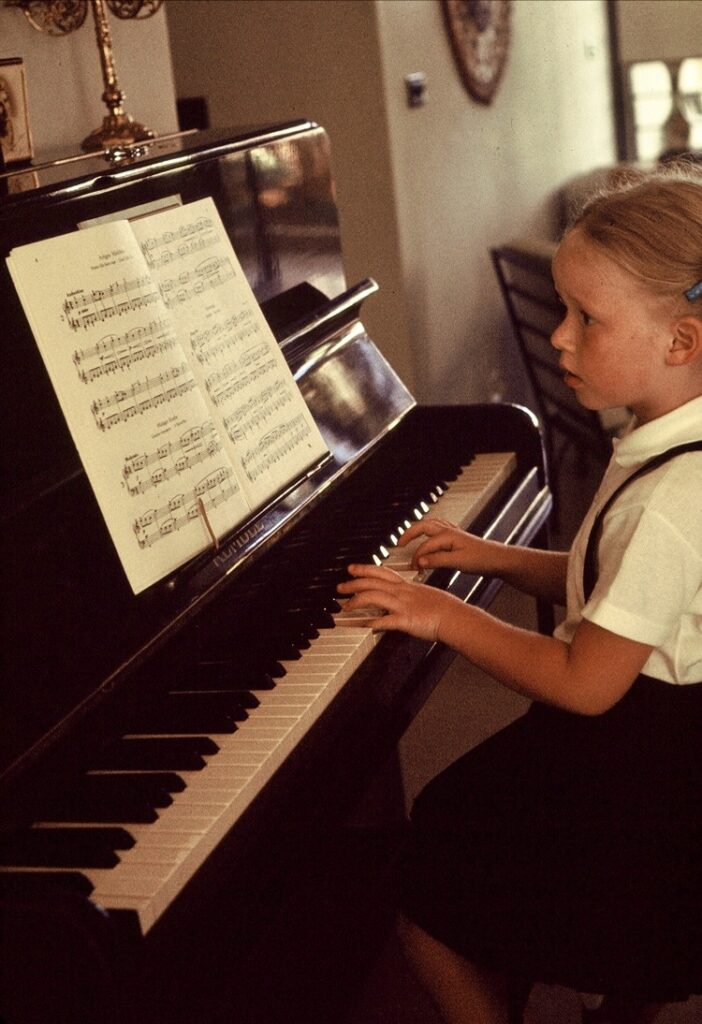
The author at six, already making soup.
As a performer, do you find it hard to get down to practise? Or do you feel like you’ve never done enough? Or maybe both?
As a kid, it was just compulsory- a set time for piano practice every day, with no discussion. I had hoops to jump through and so I did.
But then I left home, and with no one looking over my shoulder anymore, things got trickier.
As a collaborative pianist, I either had urgent deadlines which kept me motivated through sheer terror, or I would find myself procrastinating. Lots of time alone in the practice room gave me space to ruminate over old memories of being made to practice for my lessons and never feeling ready, the harsh words of a critic, or maybe a current romance that was going awry.
When you observe your thoughts during practice, what are they about? If you’re like most people, you’ll probably notice a mixture of focusing on the matter in hand—
- learning repertoire
- pondering possible technical approaches to the material
- thinking about how to structure the music
- strategising how long to spend on each movement of a piece
- thoughts about how and what you’re doing.
Do you tend towards self-criticism, blame, guilt, confusion, insecurity, perfectionism?
Or, conversely, peace, inspiration, freedom, enthusiasm? What ingredients are in what I call your “mental soup”? Is it bland and dull, tasty, or maybe too spicey?
The contents of our “mental soup” are probably very familiar to us, because we usually add the same ingredients every day, not only during practice but from the moment we wake up. No wonder we struggle in the practice room and on the concert platform. How can we be expected to suddenly become Zen masters under pressure when we’re struggling normally?
What if the answer to more mental peace and focus is about handling the relationship with yourself in real time?
If the only time your mind is calm is when you’ve practised to your liking, then you’re withholding love and approval from yourself and that doesn’t lead to good things.
If you hold out on yourself, judge, criticise or blame, as many of us were taught to do, it may feel like an incentive to work hard to earn your own approval (or that of others). However, how do you know when it’s truly enough? When someone else you admire says something approving? When you’re actually satisfied with your efforts?
Making art involves dealing with perfectionism. The idea of making perfect art is always out there, tempting us.
So, what helps?
For me, it’s come down to finding out what’s simmering in my “mental soup”.
Rather than just heading straight for the instrument or the page or the brush,
you could set a practice timer and when before you start or when you’re on a break, do a check-in. Drink some water, have a snack, maybe do some stretching, and ask yourself some questions:
- How’s your body feeling?
- How’s your energy level?
- What’s on your mind? Are you feeling down, or maybe energised?
- How can you support yourself to get in balance? What do you need?
- Is any inner criticism actually motivating you, or do you feel your energy draining away?
- How can you support yourself internally by choosing to be kinder and more forgiving of your own imperfections? How could you encourage yourself?
Coaching can be a great way to start to get to grips with your inner monologue- becoming aware is the first step, and then there are many tools that can help you get out of your rut and become an ally, rather than an adversary. And then- who knows- your soup can begin to become tastier and more nourishing!
For more info, feel free to contact me at http://free2create.com